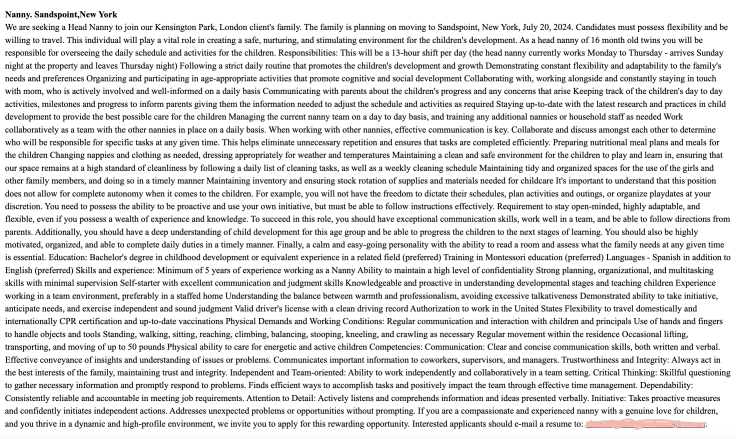
A London-based family preparing to move to New York has sparked online outrage after their 914‑word advertisement seeking a nanny for their 16‑month‑old twins, went viral.
The family's posting demands a nanny willing to work late nights and early mornings, with a scheduled 13-hour shift. Crucially, the ad stipulates 'avoid excessive talkativeness' and further outlines a strict set of behavioural expectations, stating bluntly: 'You will not have the freedom to dictate schedules, plan activities and outings, or organise playdates at your discretion.'
The role demands strict adherence to instructions from the parents, particularly the mother, who is described as 'actively involved and well-informed on a daily basis.' While the candidate is expected to be proactive, the ad warns the person must remain 'open-minded, highly adaptable, and flexible, even if you possess a wealth of experience and knowledge.'
Applicants must have at least five years of professional 'nannying' experience, preferably hold a bachelor's degree in childhood development, and ideally be trained in Montessori methods. Bilingual fluency in English and Spanish is considered a bonus.
The list of personal traits required is equally extensive, including 'excellent communication, sound judgment, discretion, and an ability to anticipate needs.' Critics say the ad reflects an overly controlling and transactional approach to caregiving, raising concerns over the treatment and expectations of domestic workers.
Labour Law Experts Weigh In
Legally, the advert sits in a grey zone. In the UK, domestic workers, like nannies, are classified as employees, not self-employed contractors.
Employers are required to provide written contracts and payslips and pay at least the national minimum wage. They must also ensure reasonable working hours and breaks, in compliance with the Employment Rights Act 1996 and the Working Time Regulations.
However, private households are exempt from the Health and Safety at Work Act, meaning some protections may not apply in home environments. The ad requirement for silence, while not explicitly illegal, may contribute to a work atmosphere that feels oppressive, raising ethical concerns even if it skirts explicit legal violations.

Again, the US Fair Labour Standards Act stipulates that caregivers must be paid for all working hours. However, requirements around emotional labour, such as being quiet or conforming to strict demeanours, are not directly regulated.
Employment law specialists note that while nanny roles often come with long hours, mandating silence could skirt dangerously close to dehumanising terms that might be challenged as intolerable working conditions.
Childcare advocates emphasise the importance of relationships and communication as core aspects of early childhood care. Imposing silence may hinder the bond between nanny and child and stunt developmental support, a concern echoed by several early childhood experts contacted by journalists.
The Need for Clear Domestic Employment Standards
Advocates of nanny rights are now calling for more robust regulation of household employment. They emphasise the need for written contracts outlining duties, pay, rest breaks, accommodations, and respectful treatment—standards already promoted by organisations like the UK Government and trade groups.
Without such clarity, this ad highlights how vulnerable domestic workers can be to exploitative terms presented as professional. The situation reflects broader concerns: with more families hiring help during global moves, there's a pressing need for uniform, cross-border employment protections, especially for live-in caregivers.
Although the family hasn't publicly replied to criticism, the advertisement's sharp tone has reignited debate around childcare expectations and worker dignity.
In an age when care is both vital and costly, ensuring that domestic work is compensated fairly, regulated clearly, and performed respectfully is essential, not merely for compliance but for upholding human decency.







